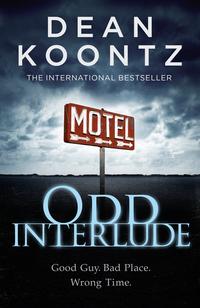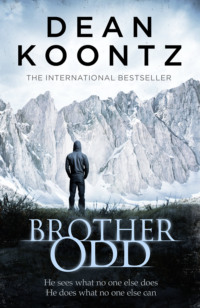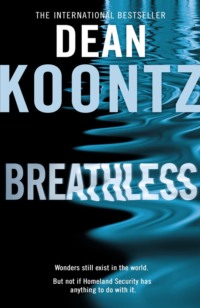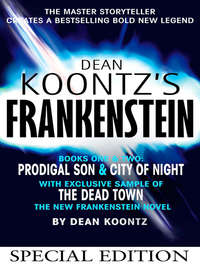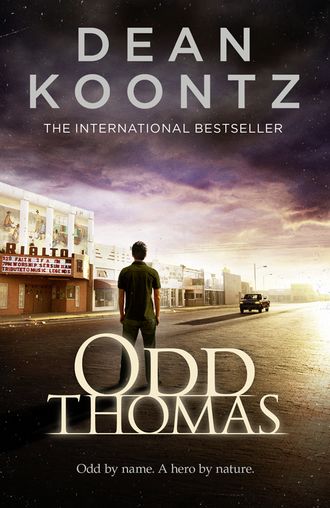
Полная версия
Odd Thomas
In moments like these, however, I can’t restrain myself from action. A kind of madness comes over me, and I can no more turn away from what must be done than I can wish this fallen world back into a state of grace.
As Harlo burst from the Pontiac, I looked down at Penny Kallisto and saw the ligature marks on her throat, which had not been visible when she had first appeared to me. The depth to which the garroting cloth had scored her flesh revealed the singular fury with which he had strangled her to death.
Pity tore at me, and I went after Harlo Landerson, for whom I had no pity whatsoever.
CHAPTER 2
BLACKTOP TO CONCRETE, CONCRETE TO grass, alongside the house that lay across the street from Mrs. Sanchez’s place, through the rear yard, to a wrought-iron fence and over, then across a narrow alleyway, up a slumpstone wall, Harlo Landerson ran and clambered and flung himself.
I wondered where he might be going. He couldn’t outrun either me or justice, and he certainly couldn’t outrun who he was.
Beyond the slumpstone wall lay a backyard, a swimming pool. Dappled with morning light and tree shadows, the water glimmered in shades of blue from sapphire to turquoise, as might a trove of jewels left by long-dead pirates who had sailed a sea since vanished.
On the farther side of the pool, behind a sliding glass door, a young woman stood in pajamas, holding a mug of whatever brew gave her the courage to face the day.
When he spotted this startled observer, Harlo changed direction toward her. Maybe he thought he needed a shield, a hostage. Whatever, he wasn’t looking for coffee.
I closed on him, snared his shirt, hooked him off his feet. The two of us plunged into the deep end of the pool.
Having banked a summer’s worth of desert heat, the water wasn’t cold. Thousands of bubbles like shimmering showers of silver coins flipped across my eyes, rang against my ears.
Thrashing, we touched bottom, and on the way up, he kicked, he flailed. With elbow or knee, or foot, he struck my throat.
Although the impeding water robbed the blow of most of its force, I gasped, swallowed, choked on the taste of chlorine flavored with tanning oil. Losing my grip on Harlo, I tumbled in slomo through undulant curtains of green light, blue shadow, and broke the surface into spangles of sunshine.
I was in the middle of the pool, and Harlo was at the edge. He grabbed the coping and jacked himself onto the concrete deck.
Coughing, venting atomized water from both nostrils, I splashed noisily after him. As a swimmer, I have less potential for Olympic competition than for drowning.
On a particularly dispiriting night when I was sixteen, I found myself chained to a pair of dead men and dumped off a boat in Malo Suerte Lake. Ever since then, I’ve had an aversion to aquatic sports.
That man-made lake lies beyond the city limits of Pico Mundo. Malo Suerte means “bad luck.”
Constructed during the Great Depression as a project of the Works Progress Administration, the lake originally had been named after an obscure politician. Although they have a thousand stories about its treacherous waters, nobody around these parts can quite pin down when or why the place was officially renamed Malo Suerte.
All records relating to the lake burned in the courthouse fire of 1954, when a man named Mel Gibson protested the seizure of his property for nonpayment of taxes. Mr. Gibson’s protest took the form of self-immolation.
He wasn’t related to the Australian actor with the same name who would decades later become a movie star. Indeed, by all reports, he was neither talented nor physically attractive.
Now, because I hadn’t been burdened on this occasion by a pair of men too dead to swim for themselves, I reached the edge of the pool in a few swift strokes. I levered myself out of the water.
Having arrived at the sliding door, Harlo Landerson found it locked.
The pajamaed woman had disappeared.
As I scrambled to my feet and started to move, Harlo backed away from the door far enough to get momentum. Then he ran at it, leading with his left shoulder, his head tucked down.
I winced in expectation of gouting blood, severed limbs, a head guillotined by a blade of glass.
Of course the safety pane shattered into cascades of tiny, gummy pieces. Harlo crashed into the house with all his limbs intact and his head still attached to his neck.
Glass crunched and clinked under my shoes when I entered in his wake. I smelled something burning.
We were in a family room. All the furniture was oriented toward a big-screen TV as large as a pair of refrigerators.
The gigantic head of the female host of the Today show was terrifying in such magnified detail. In these dimensions, her perky smile had the warmth of a barracuda’s grin. Her twinkly eyes, here the size of lemons, seemed to glitter maniacally.
In this open floor plan, the family room flowed into the kitchen with only a breakfast bar intervening.
The woman had chosen to make a stand in the kitchen. She gripped a telephone in one hand and a butcher knife in the other.
Harlo stood at the threshold between rooms, trying to decide if a twentysomething housewife in too-cute, sailor-suit pajamas would really have the nerve to gut him alive.
She brandished the knife as she shouted into the phone. “He’s inside, he’s right here!”
Past her, on a far counter, smoke poured from a toaster. Some kind of pop-up pastry had failed to pop. It smelled like strawberries and smoldering rubber. The lady was having a bad morning.
Harlo threw a bar stool at me and ran out of the family room, toward the front of the house.
Ducking the stool, I said, “Ma’am, I’m sorry about the mess,” and I went looking for Penny’s killer.
Behind me, the woman screamed, “Stevie, lock your door! Stevie, lock your door!”
By the time I reached the foot of the open stairs in the foyer, Harlo had climbed to the landing.
I saw why he had been drawn upward instead of fleeing the house: At the second floor stood a wide-eyed little boy, about five years old, wearing only undershorts. Holding a blue teddy bear by one of its feet, the kid looked as vulnerable as a puppy stranded in the middle of a busy freeway.
Prime hostage material.
“Stevie, lock your door!”
Dropping the blue bear, the kid bolted for his room.
Harlo charged up the second flight of stairs.
Sneezing out the tickle of chlorine and the tang of burning strawberry jam, dripping, squishing, I ascended with somewhat less heroic flair than John Wayne in Sands of Iwo Jima.
I was more scared than my quarry because I had something to lose, not least of all Stormy Llewellyn and our future together that the fortune-telling machine had seemed to promise. If I encountered a husband with a handgun, he’d shoot me as unhesitatingly as he would Harlo.
Overhead, a door slammed hard. Stevie had done as his mother instructed.
If he’d had a pot of boiling lead, in the tradition of Quasimodo, Harlo Landerson would have poured it on me. Instead came a sideboard that evidently had stood in the second-floor hall, opposite the head of the stairs.
Surprised to discover that I had the agility and the balance of a monkey, albeit a wet monkey, I scrambled off the stairs, onto the railing. The deadfall rocked past step by step, drawers gaping open and snapping shut repeatedly, as if the furniture were possessed by the spirit of a crocodile.
Off the railing, up the stairs, I reached the second-floor hall as Harlo began to break down the kid’s bedroom door.
Aware that I was coming, he kicked harder. Wood splintered with a dry crack, and the door flew inward.
Harlo flew with it, as if he’d been sucked out of the hall by an energy vortex.
Rushing across the threshold, pushing aside the rebounding door, I saw the boy trying to wriggle under the bed. Harlo had seized him by the left foot.
I snatched a smiling panda-bear lamp off the red nightstand and smashed it over Harlo’s head. A ceramic carnage of perky black ears, fractured white face, black paws, and chunks of white belly exploded across the room.
In a world where biological systems and the laws of physics functioned with the absolute dependability that scientists claim for them, Harlo would have dropped stone-cold unconscious as surely as the lamp shattered. Unfortunately, this isn’t such a world.
As love empowers some frantic mothers to find the superhuman strength to lift overturned cars to free their trapped children, so depravity gave Harlo the will to endure a panda pounding without significant effect. He let go of Stevie and rounded on me.
Although his eyes lacked elliptical pupils, they reminded me of the eyes of a snake, keen with venomous intent, and though his bared teeth included no hooked or dramatically elongated canines, the rage of a rabid jackal gleamed in his silent snarl.
This wasn’t the person whom I had known in high school so few years ago, not the shy kid who found magic and meaning in the patient restoration of a Pontiac Firebird.
Here was a diseased and twisted bramble of a soul, thorny and cankerous, which perhaps until recently had been imprisoned in a deep turning of Harlo’s mental labyrinth. It had broken down the bars of its cell and climbed up through the castle keep, deposing the man who had been Harlo; and now it ruled.
Released, Stevie squirmed all the way under his bed, but no bed offered shelter to me, and I had no blankets to pull over my head.
I can’t pretend that I remember the next minute with clarity. We struck at each other when we saw an opening. We grabbed anything that might serve as a weapon, swung it, flung it. A flurry of blows staggered both of us into a clinch, and I felt his hot breath on my face, a spray of spittle, and heard his teeth snapping, snapping at my right ear, as panic pressed upon him the tactics of a beast.
I broke the clinch, shoved him away with an elbow under the chin and with a knee that missed the crotch for which it was intended.
Sirens arose in the distance just as Stevie’s mom appeared at the open door, butcher knife glinting and ready: two cavalries, one in pajamas, the other in the blue-and-black uniform of the Pico Mundo Police Department.
Harlo couldn’t get past both me and the armed woman. He couldn’t reach Stevie, his longed-for shield, under the bed. If he threw open a window and climbed onto the front-porch roof, he would be fleeing directly into the arms of the arriving cops.
As the sirens swelled louder, nearer, Harlo backed into a corner where he stood gasping, shuddering. Wringing his hands, his face gray with anguish, he looked at the floor, the walls, the ceiling, not in the manner of a trapped man assessing the dimensions of his cage, but with bewilderment, as though he could not recall how he had come to be in this place and predicament.
Unlike the beasts of the wild, the many cruel varieties of human monsters, when at last cornered, seldom fight with greater ferocity. Instead, they reveal the cowardice at the core of their brutality.
Harlo’s wringing hands twisted free of each other and covered his face. Through the chinks in that ten-fingered armor, I could see his eyes twitching with bright terror.
Back jammed into the corner, he slid down the junction of walls and sat on the floor with his legs splayed in front of him, hiding behind his hands as though they were a mask of invisibility that would allow him to escape the attention of justice.
The sirens reached a peak of volume half a block away, and then subsided from squeal to growl to waning groan in front of the house.
The day had dawned less than an hour ago, and I had spent every minute of the morning living up to my name.
CHAPTER 3
THE DEAD DON’T TALK. I DON’T KNOW why. Harlo Landerson had been taken away by the authorities. In his wallet they had found two Polaroids of Penny Kallisto. In the first, she was naked and alive. In the second, she was dead.
Stevie was downstairs, in his mother’s arms.
Wyatt Porter, chief of the Pico Mundo Police Department, had asked me to wait in Stevie’s room. I sat on the edge of the boy’s unmade bed.
I had not been alone long when Penny Kallisto walked through a wall and sat beside me. The ligature marks were gone from her neck. She looked as though she had never been strangled, had never died.
As before, she remained mute.
I tend to believe in the traditional architecture of life and the afterlife. This world is a journey of discovery and purification. The next world consists of two destinations: One is a palace for the spirit and an endless kingdom of wonder, while the other is cold and dark and unthinkable.
Call me simple-minded. Others do.
Stormy Llewellyn, a woman of unconventional views, believes instead that our passage through this world is intended to toughen us for the next life. She says that our honesty, integrity, courage, and determined resistance to evil are evaluated at the end of our days here, and that if we come up to muster, we will be conscripted into an army of souls engaged in some great mission in the next world. Those who fail the test simply cease to exist.
In short, Stormy sees this life as boot camp. She calls the next life “service.”
I sure hope she’s wrong, because one of the implications of her cosmology is that the many terrors we know here are an inoculation against worse in the world to come.
Stormy says that whatever’s expected of us in the next life will be worth enduring, partly for the sheer adventure of it but primarily because the reward for service comes in our third life.
Personally, I’d prefer to receive my reward one life sooner than she foresees.
Stormy, however, is into delayed gratification. If on Monday she thirsts for a root-beer float, she’ll wait until Tuesday or Wednesday to treat herself to one. She insists that the wait makes the float taste better.
My point of view is this: If you like root-beer floats so much, have one on Monday, another on Tuesday, and a third on Wednesday.
According to Stormy, if I live by this philosophy too long, I’m going to be one of those eight-hundred-pound men who, when they fall ill, must be extracted from their homes by construction crews and cranes.
“If you want to suffer the humiliation of being hauled to the hospital on a flatbed truck,” she once said, “don’t expect me to sit on your great bloated gut like Jiminy Cricket on the brow of the whale, singing ‘When You Wish Upon a Star.’”
I’m reasonably sure that in Disney’s Pinocchio, Jiminy Cricket never sits on the brow of the whale. In fact I’m not convinced that he himself encounters the whale.
If I were to make this observation to Stormy, however, she would favor me with one of those wry looks that means Are you hopelessly stupid or just being pissy? This is a look to be avoided if not dreaded.
As I waited there on the edge of the boy’s bed, even thinking about Stormy couldn’t lift my spirits. Indeed, if the grinning images of Scooby-Doo, imprinted on the sheets, didn’t cheer me, perhaps nothing could.
I kept thinking about Harlo losing his mother at six, about how his life might have been a memorial to her, about how instead he had shamed her memory.
And I thought about Penny, of course: her life brought to such an early end, the terrible loss to her family, the enduring pain that had changed their lives forever.
Penny put her left hand in my right and squeezed reassuringly.
Her hand felt as real as that of a living child, as firm, as warm. I didn’t understand how she could be this real to me and yet walk through walls, this real to me and yet invisible to others.
I wept a little. Sometimes I do. I’m not embarrassed by tears. At times like this, tears exorcise emotions that would otherwise haunt me and, by their haunting, embitter me.
Even as my vision blurred at the first shimmer of tears not yet spent, Penny clasped my hand in both of hers. She smiled, and winked as if to say, It’s all right, Odd Thomas. Get it out, be rid of it.
The dead are sensitive to the living. They have walked this path ahead of us and know our fears, our failings, our desperate hopes, and how much we cherish what cannot last. They pity us, I think, and no doubt they should.
When my tears dried, Penny rose to her feet, smiled again, and with one hand smoothed the hair back from my brow. Good-bye, this gesture seemed to say. Thank you, and good-bye.
She walked across the room, through the wall, into the August morning one story above the front yard—or into another realm even brighter than a Pico Mundo summer.
A moment later, Wyatt Porter appeared in the bedroom doorway.
Our chief of police is a big man, but he isn’t threatening in appearance. With basset eyes and bloodhound jowls, his face has been affected by Earth’s gravity more than has the rest of him. I’ve seen him move fast and decisively, but in action and in repose he seems to carry a great weight on his beefy, rounded shoulders.
Over the years, as the low hills encircling our town have been sculpted into neighborhoods of tract houses, swelling our population, and as the meanness of an ever crueler world has crept into the last havens of civility, like Pico Mundo, perhaps Chief Porter has seen too much of human treachery. Perhaps the weight he carries is a load of memories that he would prefer to shed, but can’t.
“So here we are again,” he said, entering the room.
“Here we are,” I agreed.
“Busted patio door, busted furniture.”
“Didn’t bust most of it myself. Except the lamp.”
“But you created the situation that led to it.”
“Yes, sir.”
“Why didn’t you come to me, give me a chance to figure a way Harlo could entrap himself?”
We had worked together in that fashion in the past.
“My feeling,” I said, “was that he needed to be confronted right away, that maybe he was going to do it again real soon.”
“Your feeling.”
“Yes, sir. That’s what I think Penny wanted to convey. There was a quiet urgency about her.”
“Penny Kallisto.”
“Yes, sir.”
The chief sighed. He settled upon the only chair in the room: a child-size, purple upholstered number on which Barney the dinosaur’s torso and head served as the back support. He appeared to be sitting in Barney’s lap. “Son, you sure complicate my life.”
“They complicate your life, sir, and mine much more than yours,” I said, meaning the dead.
“True enough. If I were you, I’d have gone crazy years ago.”
“I’ve considered it,” I admitted.
“Now listen, Odd, I want to find a way to keep you out of the courtroom on this one, if it comes to that.”
“I want to find a way, too.”
Few people know any of my strange secrets. Only Stormy Llewellyn knows all of them.
I want anonymity, a simple and quiet life, or at least as simple as the spirits will allow.
The chief said, “I think he’s going to give us a confession in the presence of his attorney. There may be no trial. But if there is, we’ll say that he opened his wallet to pay some bet he’d made with you, maybe on a baseball game, and the Polaroids of Penny fell out.”
“I can sell that,” I assured him.
“I’ll speak with Horton Barks. He’ll minimize your involvement when he writes it up.”
Horton Barks was the publisher of the Maravilla County Times. Twenty years ago in the Oregon woods, while hiking, he’d had dinner with Big Foot—if you can call some trail mix and canned sausages dinner.
In truth, I don’t know for a fact that Horton had dinner with Big Foot, but that’s what he claims. Given my daily experiences, I’m in no position to doubt Horton or anyone else who has a story to tell about an encounter with anything from aliens to leprechauns.
“You all right?” Chief Porter asked.
“Pretty much. But I sure hate being late for work. This is the busiest time at the Grille.”
“You called in?”
“Yeah.” I held up my little cell phone, which had been clipped to my belt when I went into the pool. “Still works.”
“I’ll probably stop in later, have a pile of home fries and a mess of eggs.”
“Breakfast all day,” I said, which has been a solemn promise of the Pico Mundo Grille since 1946.
Chief Porter shifted from one butt cheek to the other, causing Barney to groan. “Son, you figure to be a short-order cook forever?”
“No, sir. I’ve been thinking about a career change to tires.”
“Tires?”
“Maybe sales first, then installation. They’ve always got job openings out at Tire World.”
“Why tires?”
I shrugged. “People need them. And it’s something I don’t know, something new to learn. I’d like to see what that life’s like, the tire life.”
We sat there half a minute or so, neither of us saying anything. Then he asked, “And that’s the only thing you see on the horizon? Tires, I mean.”
“Swimming-pool maintenance looks intriguing. With all these new communities going in around us, there’s a new pool about every day.”
Chief Porter nodded thoughtfully.
“And it must be nice working in a bowling alley,” I said. “All the new people coming and going, the excitement of competition.”
“What would you do in a bowling alley?”
“For one thing, take care of the rental shoes. They need to be irradiated or something between uses. And polished. You have to check the laces regularly.”
The chief nodded, and the purple Barney chair squeaked more like a mouse than like a dinosaur.
My clothes had nearly dried, but they were badly wrinkled. I checked my watch. “I better get moving. I’m going to have to change before I can go to the Grille.”
We both rose to our feet.
The Barney chair collapsed.
Looking at the purple ruins, Chief Porter said, “That could have happened when you were fighting Harlo.”
“Could have,” I said.
“Insurance will cover it with the rest.”
“There’s always insurance,” I agreed.
We went downstairs, where Stevie was sitting on a stool in the kitchen, happily eating a lemon cupcake.
“I’m sorry, but I broke your bedroom chair,” Chief Porter told him, for the chief is not a liar.
“That’s just a stupid old Barney chair, anyway,” the boy said. “I outgrew that stupid old Barney stuff weeks ago.”
With a broom and a dustpan, Stevie’s mom was sweeping up the broken glass.
Chief Porter told her about the chair, and she was inclined to dismiss it as unimportant, but he secured from her a promise that she would look up the original cost and let him know the figure.
He offered me a ride home, but I said, “Quickest for me is just to go back the way I came.”
I left the house through the hole where the glass door had been, walked around the pool instead of splashing through it, climbed the slumpstone wall, crossed the narrow alleyway, climbed the wrought-iron fence, walked the lawn around another house, crossed Marigold Lane, and returned to my apartment above the garage.
CHAPTER 4
I SEE DEAD PEOPLE. BUT THEN, BY GOD, I DO something about it.
This proactive strategy is rewarding but dangerous. Some days it results in an unusual amount of laundry.
After I changed into clean jeans and a fresh white T-shirt, I went around to Mrs. Sanchez’s back porch to confirm for her that she was visible, which I did every morning. Through the screen door, I saw her sitting at the kitchen table.
I knocked, and she said, “Can you hear me?”
“Yes, ma’am,” I said. “I hear you just fine.”
“Who do you hear?”
“You. Rosalia Sanchez.”



